As embattled patriarch seeks overseas support for multi-million-dollar deals that are sparking Israeli and Palestinian controversy, here are the sales and the buyers
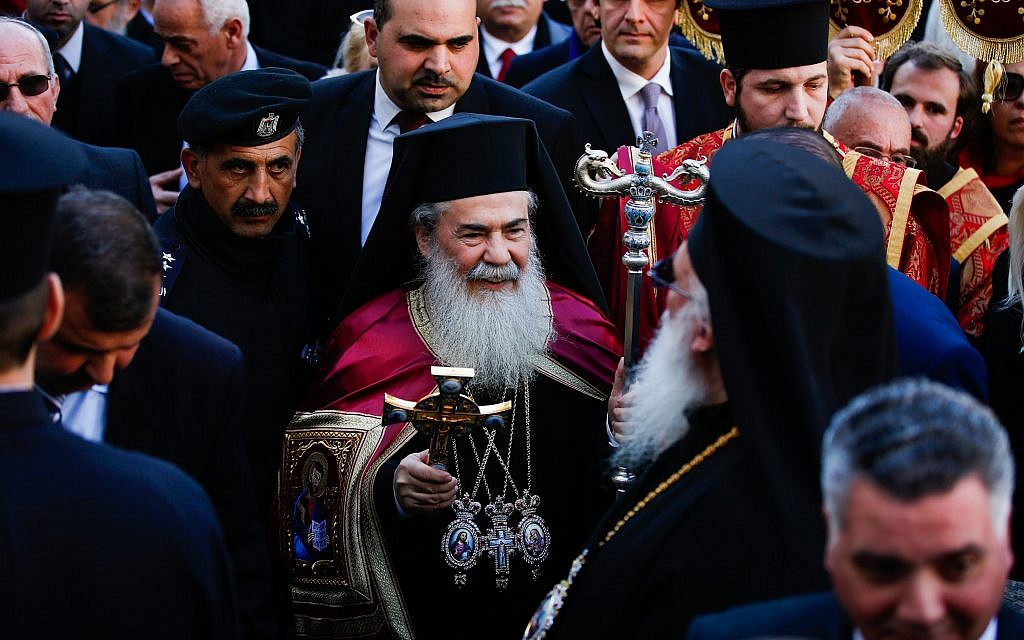
Greek Orthodox Patriarch Theophilos III arrives at the Church of the Nativity in the West Bank City of Bethlehem, built atop the site where Christians believe Jesus was born, on Christmas Eve according to the Eastern Orthodox calendar, on January 6, 2017. (Wisam Hashlamoun/Flash90)
Grappling with tens of millions of dollars of debt, the Greek Orthodox Patriarchate in Jerusalem has managed to balance its books by selling and leasing plots to a number of overseas companies all headed by Jewish investors, senior figures in the Greek Orthodox Church have told The Times of Israel.
The highly controversial deals — which have attracted opposition both in Israel and among the Palestinians, caused immense anxiety among leaseholders to the land that has been transferred to mysterious new owners, and prompted a Knesset move toward government intervention — have enabled the Patriarchate to extricate itself from its financial crisis and it does not plan to market any further tracts of land in the near future.
Church sources have denied that the plots and properties have been sold at unrealistically low prices or that there was anything untoward about the sales and have explained in detail to The Times of Israel the basis for those deals.
The key shareholder behind many of the companies buying up the plots or leases to them is David Sofer, a Jewish Israeli businessman living in London. Sofer is the main partner in Kronty Investments Ltd, which has bought whole swaths of real estate, mainly in Jerusalem, The Times of Israel has established.
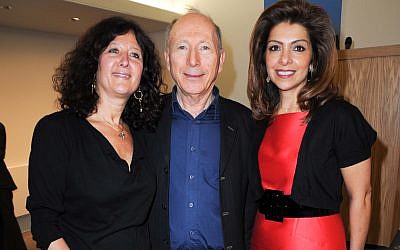
David Sofer (C) pictured with wife Cindy (L) at the opening reception of the Jewish Museum in London on March 16, 2010. (Desmond O’Neill Features Ltd)
Together with the New York-based American billionaire Michael Steinhardt, he also owns former church land under the company name Oranim Ltd.
As SMS Ltd, he and Steinhardt have also obtained leases to church land at the capital’s First Station complex, The Times of Israel can reveal.
And as Abu Tor Properties Ltd, the duo hold the lease to an undeveloped hilltop in the neighborhood of Abu Tor.
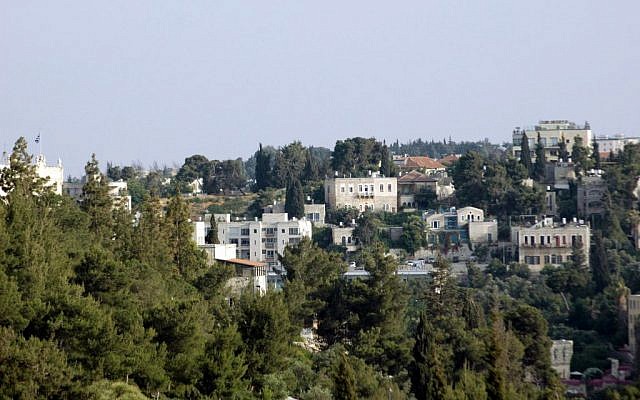
The identification of the new ownership should bring some relief to Israelis, many of whom were worried that enemy elements, such as Iranians or Qataris, have been involved in the church’s quiet sale of land to anonymous companies registered in various offshore tax havens. Considerable uncertainty still remains, however, concerning the long-term future of some of the plots and properties involved.
Under Israeli law, overseas companies wishing to buy real estate in Israel do not have to reveal their investors’ identities in order to be registered with the Israel Lands Registry.
The debts and the deals
Of all the sales, the most controversial for Israeli Jews concern land in Jerusalem on which residential buildings already stand — in the neighborhoods of Givat Oranim (now owned by Oranim Ltd.), Abu Tor (Kronty Investments Ltd.), and in Talbieh, Rehavia and Nayot (now owned by a company called Nayot Komemiyut Investments, in which Sofer and Steinhardt are not involved).
In these areas, some 1,500 homeowners lease the land on which their houses and apartments have been built. Plunged into uncertainty, they did not know who their new landowners were, whether they will renew the leases, and if so, for how much. With all the uncertainty, the values of their properties have plummeted.
Pressure from homeowners has prompted a flurry of activity in the Knesset, where one lawmaker, Rachel Azaria (Kulanu) is pushing a private member’s bill that would have the state confiscate the lands sold in return for compensation, while the justice minister has appointed a committeeunder the deputy attorney general to look into ways of protecting affected residents.
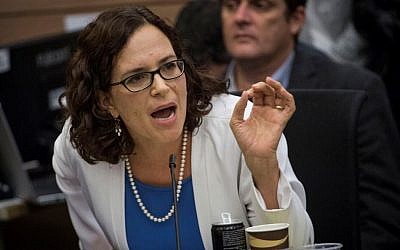
The church sources confirmed that both Sofer and Steinhardt have been close to Theophilus III since the latter was elected to be patriarch in 2005, and were instrumental in helping him to pay off inherited patriarchate debts that amounted to around NIS 160 million ($45.5 million) at a time when the Israeli government was still withholding recognition of his appointment. It recognized him only in 2007.
While the Patriarchate is the second-biggest real estate owner in Israel and holds an estimated 20 percent of the land in Jerusalem’s Old City, it has little cash income but must find $600,00-700,000 a month to pay for salaries, educational institutions and the upkeep of its many churches and monasteries in Israel, Jordan and the areas administered by the Palestinian Authority.
Unlike other Greek Orthodox patriarchates, it is independent from Greece and receives no financial support from the Greek — or any other — government.
Diplomatically, it also feels at a disadvantage to say, the Catholic Church, which has the Vatican state behind it.
The Patriarchate’s financial situation has gradually worsened over the decades since Israeli independence as its congregants — feeling sandwiched between the country’s Jews and Muslims — have emigrated overseas. Numbers have dwindled to the extent that out of around 10,000 Christians still living in Jerusalem, only 3,000 belong to the Greek Orthodox Church.
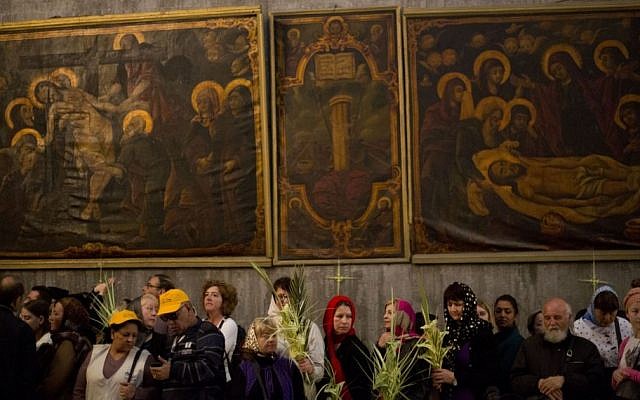
According to sources who spoke to The Times of Israel, the Patriarchate has funded its activities by buying and selling its one and only resource — investment properties — for centuries, either through leases, which have been the dominant instrument in Israel since the 1950s, or through outright sales.
Around NIS 100 million ($28.4) of the debt that Theophilus inherited in 2005 came from unpaid property taxes, inflated by interest, on some 1,000 dunams (250 acres) of its land near the Mar Elias Greek Orthodox monastery, located in southeast Jerusalem not far from Bethlehem. A further NIS 41 million (then worth around $10 million) was owed to a developer who secured the backing of arbitrators in his claim that under a previous leadership in the 1990s, the Patriarchate breached a contract to lease for development open land on a hilltop in south Jerusalem’s Abu Tor.
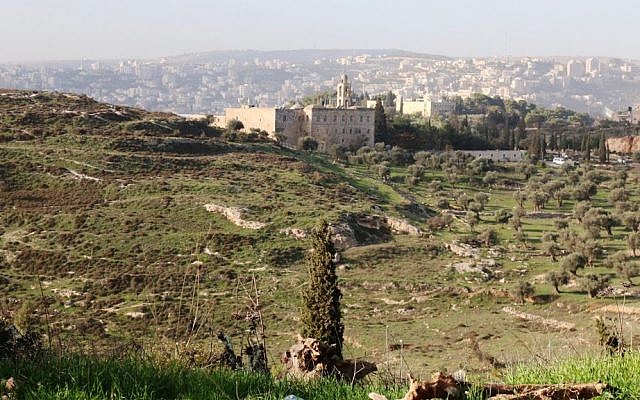
Both properties — already in the hands of the Official Receiver’s office and advertised for sale at auction when Theophilus became patriarch — were important to the church for political and religious reasons; the former because of its location in East Jerusalem, which the Palestinians claim as their capital in any future peace deal with Israel, and the latter because it is traditionally regarded as the Hill of Evil Counsel, where, according to Christian tradition, the Jewish high priest Caiaphus and his associates planned how to arrest Jesus.
In return for helping to release the Abu Tor hilltop from the bailiffs’ grasp and secure the historic church and its activities on the site, Sofer was given a 99-year lease to the land where, together with Steinhardt and under the name Abu Tor Properties Ltd, he plans to build 61 luxury residential units. Jerusalem’s local planning committee is due to discuss the plans for the first time on November 29.
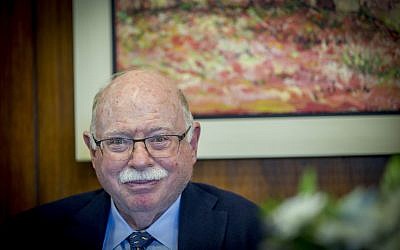
To free the Mar Elias lands, funds from various deals, including those made with Sofer and Steinhardt, helped to fund the NIS 11.5 million ($3.2 million) — down from the original NIS 100 million demanded — that the Israeli tax authorities agreed to accept in return for closing the case.
Between 2010 and 2015, Kronty Investments Ltd — which is registered in the British Virgin Islands and which includes another English Jewish investor, but in which Steinhardt is not involved — bought, as opposed to leased, several plots of land from the Greek Orthodox Patriarchate in Jerusalem.
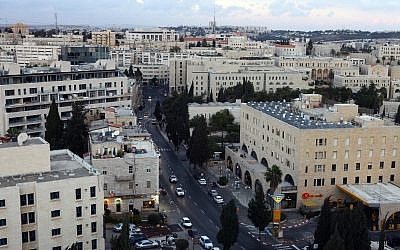
The plots are located on Tzruya Street in Abu Tor, Gad and Lifschitz streets in the southern neighborhood of Baka, Hess Street in the city center (since sold on to the plot’s Israeli leaseholders) and the upscale King David and Ben Sira streets in downtown Jerusalem.
The company is either in the midst of developing, or requesting building permits to develop, residential complexes in some of the neighborhoods and hotel and commercial space in the city center.
In 2012, Kronty also bought 27 dunams (6.7 acres) of Greek church land in the capital’s Givat Oranim neighborhood, selling this on to Oranim Ltd, which was registered in the Isle of Man last year.
The Givat Oranim deal comprises plots on Shai Agnon, Hama’apilim, Hashayarot and Mevo Haoleh streets, as well as a stretch of open land in the San Simon Park that includes the lease to a complex that once housed people with disabilities.
Elsewhere in Israel, Kronty Investments Ltd. owns land on the Habonim beach in Tiberias.
Sofer and Steinhardt also negotiated with the Patriarchate on behalf of a group of investors to buy 570 dunams (140 acres) of land in the prime Jerusalem neighborhoods of Talbieh, Rehavia and Nayot.
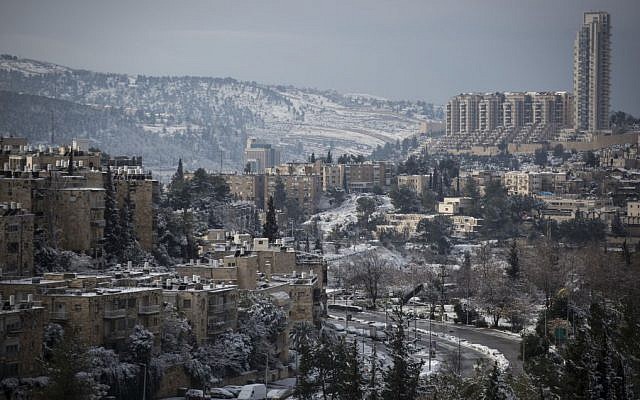
That deal was not concluded because of various complications and another company, Nayot Komemiyut Investments, stepped in and bought it instead. Nayot Komemiyut Investments is led by Jerusalemite Noam Ben David, along with an American investor now living in Israel, Moshe Greenberg, and an Australian one, Hersch Cooper. The deal is currently stuck in two complicated court cases.
Arab opposition
As well as creating uncertainty among Israeli Jews, the sales have become a political football for several Arab groups, each of which appears to have a different agenda.
For the church’s Arab opponents, the most problematic of the sales is one that Theophilus is fighting in the courts, arguing that it was concluded fraudulently.
In that deal, an employee of the church signed a contract to sell the leases to two hotels and a third property to three shell companies, behind which stood the right-wing Jewish organization, Ateret Cohanim.
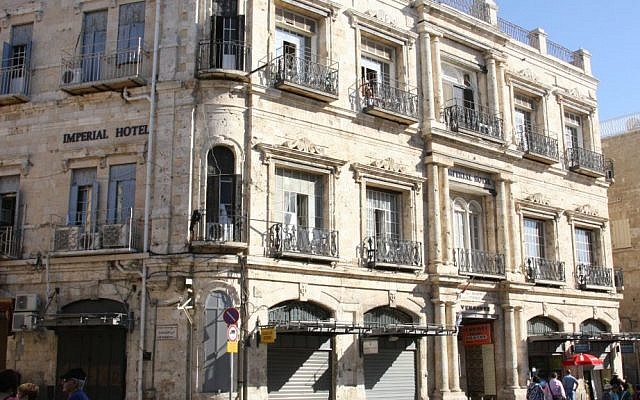
The hotels are prominently located between Jaffa Gate and the entrance to the Old City market, in the most visible part of the Christian Quarter, in East Jerusalem.
Ateret Cohanim is a controversial organization committed to settling Jews throughout the Old City.
One group, the Central Orthodox Council, which furthers an Arab nationalist agenda within the Greek Orthodox Church, has seized not only on the Jaffa Gate hotels deal but on all the sales, throughout Israel, claiming that their church has sold off the family silver to Jews and alleging that the patriarch is corrupt.
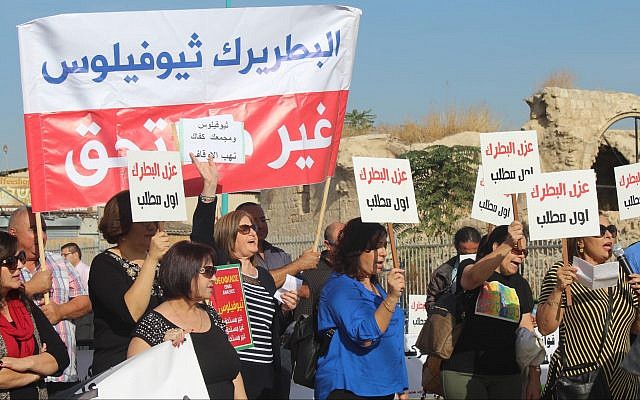
The council, which has 200 to 300 activists, has held protests in Jerusalem, Bethlehem and the coastal city of Lod over recent months calling for Theophilus to be ousted and for all Greek nationals in senior church positions to be replaced by Palestinians.
The Arab nationalists have recently been joined by several Palestinian Authority figures in a move that the church insiders see as an attempt to advance personal political agendas.
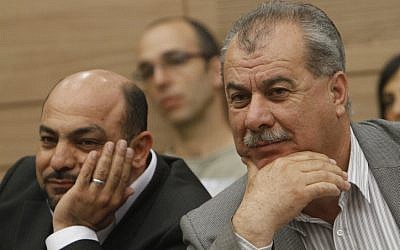
In recent weeks, possibly against the backdrop of rumored Knesset elections next year, Israeli Arab politicians have also joined the fray, among them Ayman Odeh, leader of the Joint (Arab) List, fellow party member Aida Touma-Suleiman and former MK Mohammad Barakeh, who now heads the Higher Arab Monitoring Committee, an umbrella body for Israeli-Arab organizations.
According to the Maariv newspaper, Barakeh told a protest gathering earlier this month that the Greek Orthodox Patriarchate’s properties belonged to the Palestinian people just as much as the properties of the Islamic Wakf did.
Seeking support overseas
The patriarch is troubled most by Azaria’s bill, which he sees as endangering the church’s right to deal freely with its own lands, and the Jaffa Gate deal, which was so controversial when it first came to light that it led to the sacking of Theophilus’s predecessor.
It is these two cases that have prompted Theophilus to embark on an unprecedented international tour to garner support, with the backing of all the Holy Land’s churches.
So far, he has visited the king of Jordan, the pope, the Archbishop of Canterbury, and senior political figures in Greece and Cyprus. At the beginning of December, he will visit Russia.
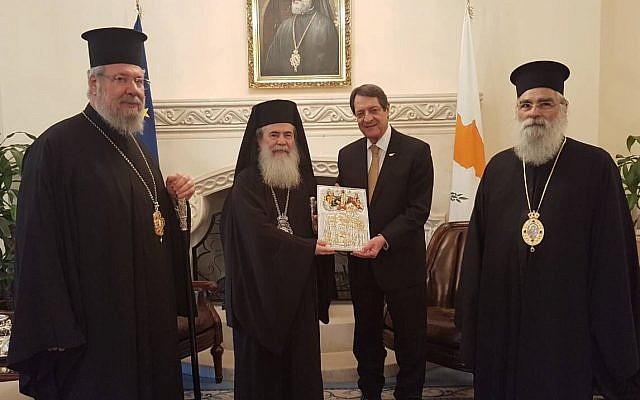
The church sources stressed that the Patriarchate chose to sell land in order to balance the books and that it selected only tracts which do not have religious significance and which it did not expect Israel to ever return.
Lease agreements were a “respectable instrument for land confiscations,” they told The Times of Israel, adding that the Israeli state had ensured that the church would not be able to build on any undeveloped lands that it owned by zoning them as open land or land earmarked for agriculture or industry.
The sources also challenged claims by the Central Orthodox Council and sectors of the Israeli media that the lands were sold off at rock-bottom prices, saying that the value of large swaths had been brought down by the existence of leases which still had many years to run.
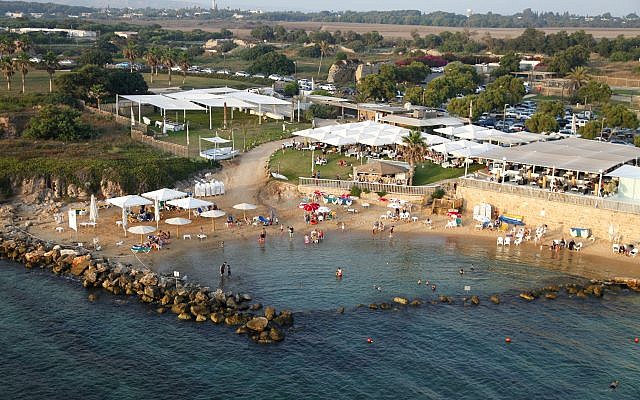
In Caesarea, for example, the patriarchate sold around 430 dunams (108 acres) to a company called St Ventures for just $1.5 million because a 135-year lease to the State of Israel, signed in 1974, still had 92 years to run and was renewable for a further 100 years. Furthermore, part of the land falls within a national park and the rest is designated for agricultural use only.
The lease on six dunams (1.5 acres) of commercial land sold in Jaffa to the Bona Trading company for $2 million still has 90 years to go. In Givat Oranim, where leases on some 240 apartments, as well as a large shopping center, still have 52 years to run, the land was sold for $5 million. All the prices include property taxes as well.
The sources denied that the real estate companies had opted for offshore tax havens to dodge taxes, saying all taxes were and have to be paid in Israel before landowners can register their new property rights.



Just so long as the land winds up in Jewish hands, Mazel tov.